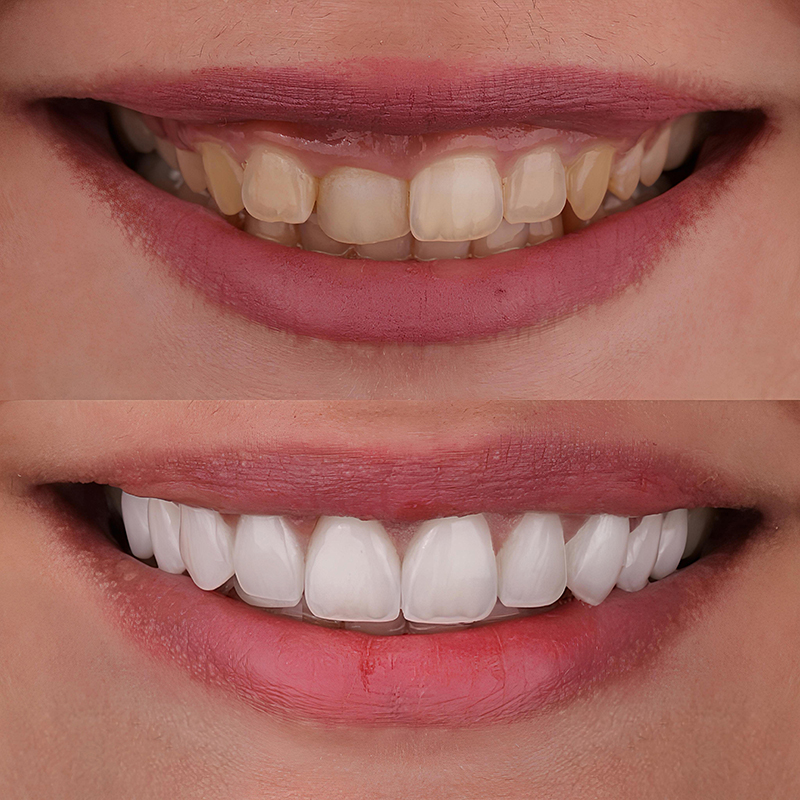Unlocking the Power of Porcelain Dental Crowns: A Guide to a Picture-Perfect Smile
When it comes to achieving a picture-perfect smile, porcelain dental crowns can work wonders. Designed to restore both the beauty and functionality of damaged teeth, these crowns offer a transformative solution. Whether you have chipped, discolored, or misshapen teeth, porcelain crowns provide a natural-looking and long-lasting fix.
Unlocking the power of porcelain dental crowns starts with understanding their benefits. Crafted from high-quality ceramic material, these crowns mimic the appearance of real teeth, blending seamlessly with your smile. Their durability ensures that you can confidently eat your favorite foods without worrying about damage. And with advancements in dental technology, modern porcelain crowns are stronger than ever before.
But it’s not just aesthetics and strength that make porcelain crowns the go-to choice for smile enhancements. They also protect and strengthen weakened teeth, preventing further damage and decay. Schedule a consultation with your dentist to discuss whether porcelain dental crowns are the right solution for you. Unlock the power of a picture-perfect smile with porcelain crowns and regain your confidence.
What are porcelain dental crowns?
Porcelain dental crowns are custom-made caps that are designed to fit over a tooth to restore its shape, size, strength, and appearance. They are crafted from high-quality dental porcelain, which allows them to mimic the natural translucency and color of real teeth. This makes them an excellent choice for restoring teeth that are damaged, decayed, or discolored. Crowns can be used on both front and back teeth, providing versatility in cosmetic and restorative dentistry.
The process of creating porcelain crowns involves taking precise impressions of the patient’s teeth. These impressions are then sent to a dental laboratory, where skilled technicians fabricate the crowns to perfectly match the patient’s natural tooth color and shape. Once completed, the crowns are permanently cemented onto the prepared teeth, effectively sealing and protecting them from further damage. This bespoke nature ensures that each crown is uniquely tailored to fit seamlessly within the patient’s mouth.
In addition to their aesthetic appeal, porcelain crowns also serve a functional purpose. They can provide support to a tooth that has undergone root canal therapy, cover a dental implant, or complete a dental bridge. By restoring both appearance and function, porcelain crowns can significantly enhance a patient’s overall oral health and confidence in their smile.
Benefits of porcelain dental crowns
 One of the primary benefits of porcelain dental crowns is their natural appearance. Unlike other types of crowns, such as those made from metal or resin, porcelain crowns have a translucent quality that closely resembles the look of natural teeth. This allows for a more aesthetic and pleasing smile, especially in visible areas of the mouth. Patients can feel confident knowing that their crowns blend seamlessly with their existing teeth.
One of the primary benefits of porcelain dental crowns is their natural appearance. Unlike other types of crowns, such as those made from metal or resin, porcelain crowns have a translucent quality that closely resembles the look of natural teeth. This allows for a more aesthetic and pleasing smile, especially in visible areas of the mouth. Patients can feel confident knowing that their crowns blend seamlessly with their existing teeth.
Durability is another significant advantage of porcelain crowns. While they are made from ceramic materials, advancements in dental technology have increased their strength and longevity. Porcelain crowns can withstand normal chewing forces and resist wear and tear, making them a practical option for everyday use. Their durability means that patients can enjoy their favorite foods without the fear of damaging their crowns, contributing to a more enjoyable dining experience.
Moreover, porcelain dental crowns can protect weakened teeth from further decay and damage. They act as a barrier against bacteria and plaque buildup, decreasing the chances of developing additional cavities or infections. This protective function is particularly crucial for teeth that have been previously treated for decay, as it helps maintain their integrity and prolongs their lifespan.
Procedure for getting porcelain dental crowns
The process of obtaining porcelain dental crowns typically involves multiple visits to the dentist. During the initial consultation, the dentist will evaluate the condition of the teeth and discuss treatment options with the patient. This may include taking X-rays or performing other diagnostic tests to ensure that crowns are the best solution for the specific dental issues present.
Once the decision is made to proceed with porcelain crowns, the dentist will prepare the affected tooth or teeth. This preparation involves removing any decay, shaping the tooth, and ensuring that there is enough structure to support the crown. After preparing the tooth, the dentist will take impressions, which will be used to create a custom-fit crown. A temporary crown may be placed over the prepared tooth to protect it while the permanent crown is being fabricated.
After the laboratory completes the custom porcelain crown, the patient will return for a follow-up appointment. During this visit, the dentist will remove the temporary crown and carefully place the permanent crown onto the prepared tooth. Adjustments may be made to ensure a proper fit and bite alignment. Once the patient is satisfied with the look and feel of the crown, it will be permanently cemented in place.
Caring for porcelain dental crowns
Caring for porcelain dental crowns is essential to ensure their longevity and maintain good oral health. While porcelain crowns are durable, they still require proper hygiene practices similar to natural teeth. Regular brushing and flossing are crucial for preventing plaque buildup and maintaining the surrounding gum health. Patients should use a soft-bristled toothbrush and fluoride toothpaste to clean their crowns gently, avoiding abrasive products that could scratch the surface.
In addition to regular brushing, dental visits for professional cleaning and check-ups should not be neglected. Dentists can help monitor the condition of porcelain crowns and surrounding teeth, addressing any issues that may arise. During these visits, dental hygienists can provide thorough cleanings that help prevent gum disease and other oral health problems, ensuring that the crowns remain in excellent condition.
Moreover, patients should be mindful of their dietary habits. While porcelain crowns are strong, they can be susceptible to chipping or cracking if subjected to excessive force. Chewing on hard foods such as ice, hard candies, or nuts should be avoided. If patients grind their teeth at night, a night guard may be recommended to protect both natural teeth and crowns from potential damage.
Common misconceptions about porcelain dental crowns
One common misconception about porcelain dental crowns is that they are only for cosmetic purposes. While they do significantly enhance the appearance of a smile, their primary function is to protect and restore damaged teeth. Crowns provide structural support for weakened teeth and can be vital in maintaining overall dental health. Patients often overlook these functional benefits when considering their options for dental restoration.
Another myth is that porcelain crowns are fragile and prone to breaking. This stems from the misconception that all porcelain is delicate. In reality, modern dental porcelain is engineered to be incredibly durable and resistant to wear. Although they can chip if subjected to extreme force, when cared for properly, porcelain crowns can last many years without significant issues. The strength of contemporary porcelain crowns makes them a reliable choice for both the front and back teeth.
Lastly, some people believe that getting porcelain crowns is a painful experience. Many patients express anxiety about dental procedures, but the crown placement process is typically straightforward and comfortable. Dentists employ local anesthesia to numb the area, ensuring that patients feel minimal discomfort during the procedure. With advances in dental techniques, many individuals report feeling little to no pain during the process.
How long do porcelain dental crowns last?
The longevity of porcelain dental crowns can vary based on several factors, including the patient’s oral hygiene habits, the location of the crown, and the types of foods consumed. Generally, porcelain crowns are designed to last between 10 to 15 years, but with proper care, some can last even longer. Regular dental check-ups and good oral hygiene practices play a significant role in extending the life of crowns. Additionally, the skill of the dentist who places the crown can impact its lifespan.
A well-fitted crown created by an experienced professional will likely perform better and last longer than one that has not been properly designed or placed. Ensuring that the crown fits comfortably and aligns correctly with other teeth can help prevent wear and damage over time.
Patients can also influence the longevity of their porcelain crowns through their lifestyle choices. Avoiding hard foods, practicing good oral hygiene, and addressing any habits like teeth grinding can significantly affect how long crowns last. By being proactive about dental care and maintenance, patients can enjoy their porcelain crowns for many years without needing replacements.
Alternatives to porcelain dental crowns
While porcelain dental crowns are a popular choice for dental restoration, there are several alternatives that patients can consider based on their specific needs. One common alternative is metal crowns, which are made from materials like gold or silver alloys. Metal crowns are known for their strength and durability, making them suitable for back teeth where the pressure from chewing is greater. However, they lack the aesthetic appeal of porcelain crowns and are more visible in the mouth.
Another option is resin crowns, which are made from composite materials. These crowns are often more affordable than porcelain or metal crowns, making them an attractive choice for those on a budget. However, resin crowns tend to be less durable and may wear down faster than porcelain crowns, leading to a shorter lifespan. They can also be more prone to staining, which may impact their appearance over time.
Lastly, dental implants can serve as an alternative for individuals who have lost a tooth entirely. An implant consists of a titanium post surgically placed in the jawbone, topped with a crown that can be made of porcelain or other materials. This option provides a permanent solution for tooth loss and offers excellent functionality and aesthetics. However, dental implants require a surgical procedure and a longer healing process compared to crowns.
Cost of porcelain dental crowns
The cost of porcelain dental crowns can vary widely based on several factors, including geographic location, the complexity of the case, and the specific dental practice. On average in Turkey, patients can expect to pay anywhere from €150,- to €200,- per crown. It’s essential to consult with a dentist to obtain an accurate estimate based on individual needs and circumstances.
Achieving a picture-perfect smile with porcelain dental crowns
Porcelain dental crowns are a powerful tool in achieving a picture-perfect smile, combining aesthetic appeal with functional benefits. They provide a natural look that seamlessly integrates with existing teeth while protecting damaged ones. Understanding the benefits, procedures, and care associated with porcelain crowns empowers patients to make informed decisions about their dental health.
As with any dental treatment, it’s essential to consult with a qualified dentist to discuss individual needs and options.
With proper care and regular dental visits, porcelain crowns can last for many years, contributing to a confident and beautiful smile. Whether addressing cosmetic issues or restoring functionality, porcelain dental crowns can unlock the potential for a healthier and more radiant smile, allowing individuals to face the world with renewed confidence.
By choosing porcelain dental crowns, patients embark on a journey toward enhanced oral health and an improved quality of life, reaffirming the importance of investing in one’s smile.

